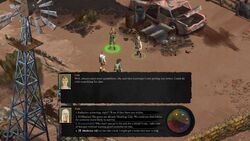Vault Dweller's Theoretical Introduction to the cRPG genre, with Examples Aplenty
Vault Dweller's Theoretical Introduction to the cRPG genre, with Examples Aplenty
None - posted by Elwro on Mon 28 January 2008, 15:25:08
Tags: Vince D. WellerWe've all took part in "What constitutes a role-playing game?" discussions. If you're like me, you've decided to stay far away from such topics a long time ago. But there are still those adamant in their belief that the matter is possible to be (and should be) properly discussed. Vault Dweller of Iron Tower Studio shows the way in his detailed piece over at the ITS forums. Here's a bit from the introduction:
The only thing that everyone seems to agree on is that nobody can agree on what a computer role-playing game is. If you are told that a new shooter is announced, you have a pretty good idea of what to expect. If you are told that a new RPG is announced, that tells you nothing at all. Japanese or Western? North American or European? Action or story-driven? Sandbox? Dungeon crawler? Original or licensed? Who's the developer? With shooters it hardly matters who makes them. I'll be surprised if Far Cry 2 won't play like Far Cry 1, yet the difference between the same looking Knights of the Old Republic games is huge.
So, hopefully, this handy guide will explain what role-playing is and isn't and help you understand the RPG market.There's a handy little dictionary of cRPG-related terms at the end, for example:
Dungeon Crawler – a game designed by people who think that dungeons are the most awesome aspect in any RPG and the rest is meaningless garbage. These games offer you endless chains of dungeons to explore and loot.
(...)
Licensed – reference to a setting that’s based on a licensed property like Dungeons™ & Dragons™, in which case the likelihood of running into an elf™ is 99.9%. There are rumors of an RPG based on Aliens™ where a spaceship filled the aliens ™ is crashed somewhere on the Sword Coast™ and the aliens™ start eating elves™. I’ve already pre-ordered.
(...)
Classic – a game built around meaningful choices, dialogues, and role-playing as described in this article. If you don’t like classic, pick any other word.So, are old dungeon crawlers like Dungeon Master "classics" or not? Or maybe they are classics of just the dungeon crawler subgenre, not having much to do with roleplaying as outlined by VD? Read the comprehensive article here.
Spotted at: RPG Watch
The only thing that everyone seems to agree on is that nobody can agree on what a computer role-playing game is. If you are told that a new shooter is announced, you have a pretty good idea of what to expect. If you are told that a new RPG is announced, that tells you nothing at all. Japanese or Western? North American or European? Action or story-driven? Sandbox? Dungeon crawler? Original or licensed? Who's the developer? With shooters it hardly matters who makes them. I'll be surprised if Far Cry 2 won't play like Far Cry 1, yet the difference between the same looking Knights of the Old Republic games is huge.
So, hopefully, this handy guide will explain what role-playing is and isn't and help you understand the RPG market.
Dungeon Crawler – a game designed by people who think that dungeons are the most awesome aspect in any RPG and the rest is meaningless garbage. These games offer you endless chains of dungeons to explore and loot.
(...)
Licensed – reference to a setting that’s based on a licensed property like Dungeons™ & Dragons™, in which case the likelihood of running into an elf™ is 99.9%. There are rumors of an RPG based on Aliens™ where a spaceship filled the aliens ™ is crashed somewhere on the Sword Coast™ and the aliens™ start eating elves™. I’ve already pre-ordered.
(...)
Classic – a game built around meaningful choices, dialogues, and role-playing as described in this article. If you don’t like classic, pick any other word.
Spotted at: RPG Watch














